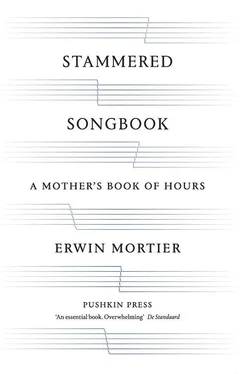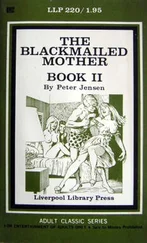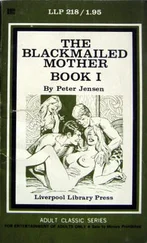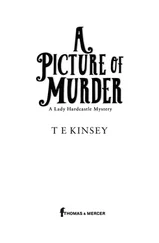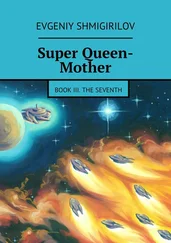
And there is that other dream, a dream that as time goes on returns more and more frequently. I am staying with friends, family and loved ones in a house somewhere in woody hill country. It is early in the morning, a golden-yellow morning of a day at the height of summer. I walk through the house, and in the rooms hear the breathing of all those still asleep, past the table with the empty glasses and plates from the evening meal, onto a terrace, descending the steps into the garden, which slopes down to the wood. The grass gives off an overpowering smell of the earth; the sun is playing in the tops of the trees.
I sit down on a bench by a stream, suck in the air, the silence and the sounds of the sleeping life in the house. And there is always a voice that says: this is your last day. I’m not seized by fear at that moment, not even sadness. Only a yawning regret that everything will soon be over. I feel it as a bout of nausea and cramp in my jaws, deeply in love with life as I am, gruesome, majestic life.

Being ill was a kind of weightlessness when I was a child, a treat, taking leave of myself through fever and the shivers, as if I was going to evaporate. When I lay on the sofa at home racked by flu, I would wait until time shivered perceptibly through the rooms and death invariably followed at two-thirty, the time when objects lost the memory of their use. The fingerprints of their purpose slid off them and they appeared to me in a threatening nakedness, just as the worn-out things in the attic, liberated from any context, entertained each other with cheerful promiscuity and no longer cared a fig about habits.
But nothing could equal the abysmal feeling when the awareness revealed itself that it did not matter at all to objects whether I was there to see them or not. I waited for that shock, time after time, with the same mixture of rapture and terror that drove my pals towards the bumper cars at the village fair. They screamed their heads off at every collision, in something halfway between a guffaw and a cry of fear. Beneath the veils of habit objects demonstrated solemn indifference. I could sometimes be deadly jealous of their superior ability to be filled with what was absent. That ineffable privilege objects have of being not at home in themselves.
Then you would bring me glasses of diluted lemon juice, in order to tear me free, with the bitter aftertaste and the sudden assault on my taste buds, of my daily death.

We are not aware of even a tenth of the extent to which, long after the physical umbilical cord has been cut, we remain present in the membranes of our parents. Only when they disappear and die, when that alarmingly banal transition from life to death takes place in their bodies, is the last link severed. Then the weight of their fists slides from our shoulders, a weight we only feel when it is lifted.
It is a catharsis that liberates and wounds in equal measure. I feel like making music, crying languorously, rejoicing — all at once. And also cursing and hurling the kind of cries at the incomprehensibility of the universe that, equipped with more music, we used to call prayers. Nothing is unambiguous, to the extent it ever was.
It is unreal yet a fact that we can only truly reach out to our parents when they are less and less present, that the final farewell has to come before we no longer confront each other as parents and children.
If anyone had told me fifteen or twenty years ago that mourning also contains rage, seething rage, or surges of unbridled desire, I would have nodded pityingly as if listening to an obscure mathematical equation being explained by a fruitcake. The raw blessing of being knocked to and fro in the surf of longing, tumbling with the surging tide, to break on the beach, to feel the fear and sadness being pulverized. Honi soit qui mal y pense . One can be too young, or at least too wet behind the ears. One can know everything but not all knowledge has already been embodied. If only there were someone who was given time, before the body turns out the lamps in all its rooms, to write down what it is, if it is only: there’s not much to it. It’s over just like that.

I try to tell myself — it seems to be best for everyone, not least myself — that there is no longer a person contained in that body. That when you feel in my drawers for spoons or forks or try to pull the hem of the tablecloth level with the edge of the table with your fingers, nothing more is involved than a set of reflexes, remnants of a memory of actions that flares up momentarily in your neurones.
It’s easier when I write about it than when you’re in front of me. My imagination, that most human of our characteristics, gets in my way, and despite everything reconstructs a personality from that battered mosaic. Then I find it difficult to think of the moment when we shall have to decide that it’s enough. Then I think, though I am not religious at all: a human being has a soul.
But it may be that we need precisely that illusion to be able to let her go lovingly.

Were we right to keep silent with her? For as long as she could still speak, however falteringly, she never indicated that she felt there was anything seriously wrong. But what about afterwards, when language had already gone, but there may still have been some more or less lucid awareness in her mind? Should we have said: you’re ill, Mum, but it doesn’t matter, we’re with you. You’re forgetting all sorts of things, and you’ll forget even more, but it doesn’t matter.
Would she have wanted to give some sign? There is no answer to those questions, although they will go on gnawing at me as long as I live.
I don’t believe she would ever have opted for an assisted death. When she had cancer she reacted in an oddly calm way. She seemed ready to accept that it could end badly, but fortunately it ended well.
What can make me angry is the thought that all kinds of grousers and plaster saints will find her suffering more edifying than the painful dilemmas, the struggles or the pain of those who do decide to bow out in good time — and by extension the suffering and concern of my father and his children — more virtuous then those who help and support their loved ones in their conscious decision to end their own lives. The impoverished view of morality this expresses, and the exalted way in which the grocers of suffering set themselves as prophets.
If only I could have just one look inside that head of hers. If only I could check to see if there is still “anyone” there. I was in the bath last week and heard on the radio a piece about scientists who have succeeded in talking to whales or dolphins. Even whales are more communicative than my mother now.
If I could look into her head, and someone were to say: I want to stick it out to the bitter end, I would be reassured. But if the message was: let me go, please — I wouldn’t hesitate for a second, not a second.

Читать дальше
